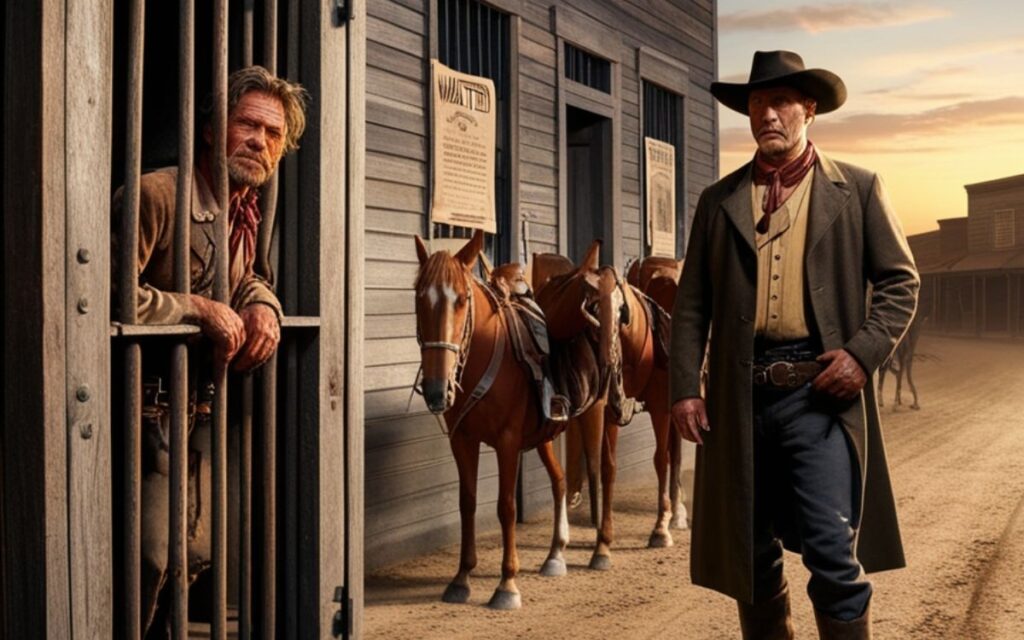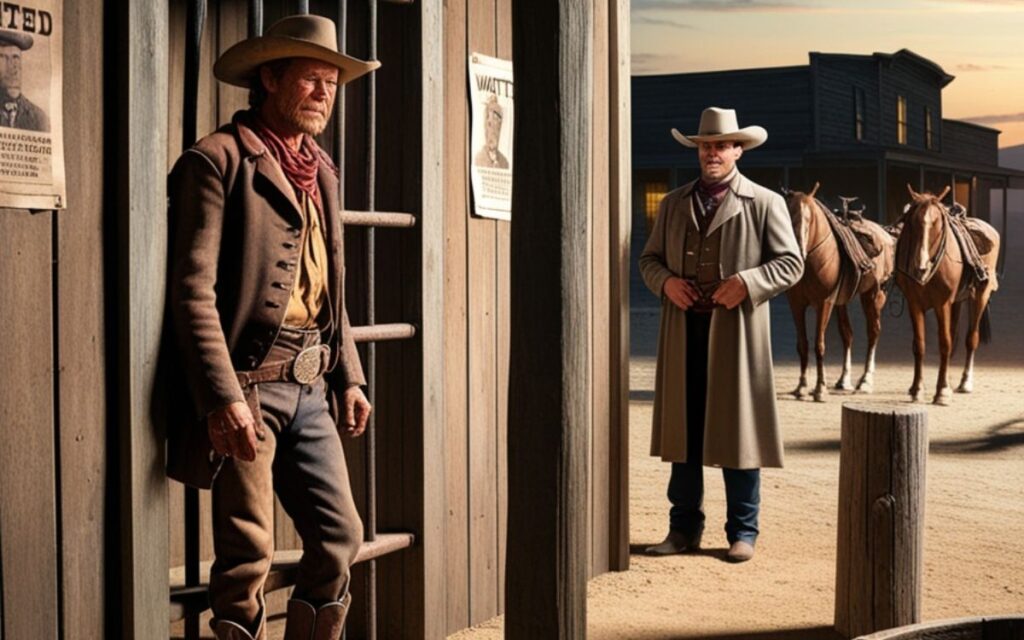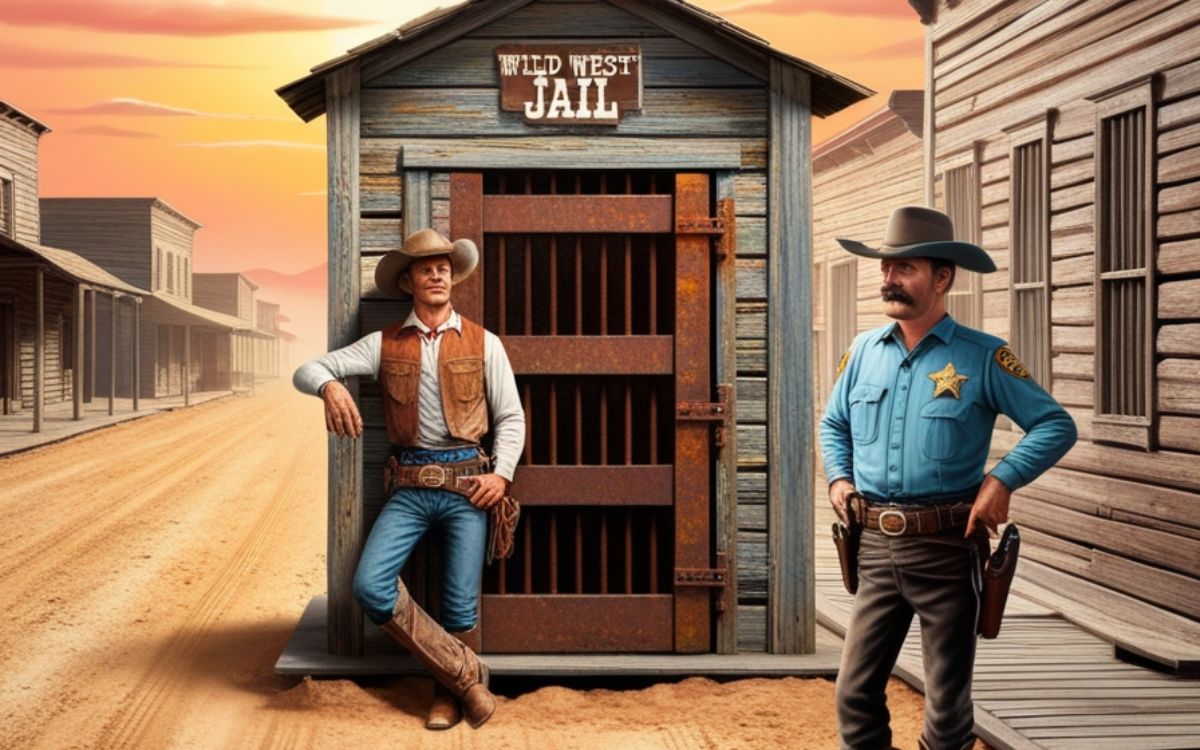The word hoosegow means a small jail where people stayed after breaking rules. Cowboys, sheriffs, and townsfolk used it in stories and daily talk. It adds a playful and lively feel to old tales of the Wild West.
The origins of hoosegow come from the Spanish word juzgado, which means court. English speakers changed the sound over time, making it easier to say. This shows how languages mix and how new words can grow from old ones.
Writers and filmmakers use hoosegow to bring Western stories to life. It appears in books, movies, and shows about cowboys and outlaws. The word helps people imagine dusty streets, small jails, and the charm of frontier towns.
What Is ‘Hoosegow’?
Hoosegow is a funny old word people once used in the Wild West. It means a small jail where cowboys or outlaws stayed after causing trouble in town. The word makes old stories sound lively and full of Western spirit.
Long ago, people used hoosegow in movies and cowboy tales. It helped show the wild days of sheriffs, horses, and dusty streets. This word reminds us of old times when justice was quick, and every small town had its own tiny jailhouse.
| Feature | Details |
| Part of Speech | Noun |
| Meaning | A jail, typically a small or temporary detention place |
| Tone | Informal, humorous, sometimes old-fashioned |
| Common Contexts | Slang, Western dialogue, comedic reference |
| First Known Use | Early 20th century |
The Etymology of ‘Hoosegow’
The word hoosegow came from the Spanish word juzgado, which means a court or place of law. When English speakers heard it, they said it in their own way, and the sound slowly changed to what we know today.
People in the American Southwest used hoosegow during the old cowboy days. Spanish and English mixed often in that region, creating new words like this one. It shows how different cultures shared language and shaped the way Americans spoke in the past.
See also : Bespeckled vs Bespectacled: What’s the Real Difference?
Spanish Origins: From ‘Juzgado’ to ‘Hoosegow’

The Spanish word juzgado means a courtroom or place where judges work. When English speakers in the old West heard it, they said hoosegow instead. The new sound felt easier for them, and the word became part of their daily talk.
This mix of Spanish and English shows how language can change over time. People shared words and stories, creating colorful slang like hoosegow. It tells us how cultures blended on the frontier and how one simple word carried a piece of history.
Language Transformation Breakdown:
The word hoosegow changed slowly as people spoke it in different ways. It started in Spanish, but English speakers made new sounds from it. This change showed how languages can grow and blend when people from different places live together.
Over time, travelers and settlers shared stories using hoosegow in their own speech. The sound became part of American slang, turning from a formal word into something playful. This simple shift showed how speech can transform across cultures and generations.
| Spanish Term | Pronunciation | Meaning | Anglicized Form |
| juzgado | hoos-GAH-do | courtroom | hoosegow |
Historical
- Early 1900s: Cowboys and settlers in the American Southwest used it in daily speech.
- Newspapers & Books: Appeared in frontier newspapers and dime novels describing small-town jails.
- Cowboy Lingo: Became common slang for temporary jail stays in Western towns.
- Comedic Tone: Often used humorously in stories to make jail scenes lighthearted.
Contemporary
- Books & Stories: Appears in modern Western novels to create old-timey settings.
- Movies & TV Shows: Used in scripts for humor or historical flavor in frontier scenes.
- Comedic Speech: People use it jokingly to refer to jail in everyday talk.
- Nostalgic References: Keeps the Wild West culture alive in podcasts, cartoons, and media.
Pronunciation Guide
The word hoosegow sounds like “hoos-gow.” The first part rhymes with “goose,” and the second part is short and quick. Speaking it this way helps the word keep its fun and lively sound from the old Western days.
Learning to say hoosegow correctly makes stories about cowboys and sheriffs sound real. The clear pronunciation keeps the word’s charm alive. It reminds people of dusty towns, wooden jail doors, and the colorful speech of the American frontier.
See also : Klutz Meaning: Definition, Origin & Real-Life Examples
Usage in Early American Slang
In early American slang, hoosegow became a popular word in cowboy towns and frontier stories. People used it to talk about small jails where outlaws stayed overnight. It gave everyday speech a lively and humorous Western feeling.
Writers and speakers liked using hoosegow because it sounded friendly and bold. Newspapers, books, and campfire tales included it often. The word added color to the language, showing how people mixed fun and storytelling in their daily talk.
How ‘Hoosegow’ Is Used Today
Today, hoosegow appears mostly in books, movies, and shows about the Wild West. Writers and filmmakers use it to make stories feel old-timey. It helps people imagine small-town jails, cowboys, and sheriffs from long ago in a fun way.
Comedians and storytellers also use hoosegow to add humor. The word keeps history alive while making speech lively. Even if people do not use it every day, it remains a colorful part of American language and culture.
Modern Use Cases:
Writers use hoosegow to make stories feel like the Old West. It shows small-town jails, sheriffs, and outlaws in a clear, vivid way. The word helps readers picture dusty streets and wooden jail doors from long ago.
TV shows and movies also include hoosegow for humor and history. Comedians and storytellers use it to make jail scenes playful. This keeps the word alive while connecting audiences to old American towns and frontier life.
- Storytelling: Writers use it to create an Old West feel in books and articles.
- Film & TV: Shows include it to depict sheriffs, outlaws, and small-town jails.
- Comedy: Comedians use it for playful or humorous references to jail.
- Historical Education: Helps teach about frontier life and early American culture in engaging ways.
Pop Culture References

Western Films and Shows
Many Western films and shows used hoosegow to make stories feel real. Sheriffs, cowboys, and outlaws often mentioned it. The word added a lively, old-time feeling, helping viewers imagine dusty streets and small jails in classic American towns.
Shows like Gunsmoke and Bonanza included Western films and shows to bring humor and charm to their scenes. The word made dialogue playful while keeping the spirit of frontier life alive for audiences of all ages.
- Classic TV Series: Appeared in shows like Gunsmoke and Bonanza to depict frontier jails.
- Comedic Films: Used in movies like Blazing Saddles for humor and old-time charm.
- Dialogue Flavor: Added authentic Western speech for sheriffs, outlaws, and townsfolk.
- Cultural Icon: Helped cement the word in American pop culture and storytelling.
Modern Media
- Movies: Directors like Quentin Tarantino include it in Western-style jail scenes.
- Animated Shows: Appears in series like The Simpsons or Family Guy for humor.
- Podcasts & Stories: Used to add old-time charm in historical or cowboy-themed content.
- Comedic Writing: Helps create playful references to small jails in modern scripts and books.
Synonyms and Related Slang
| Slang Term | Meaning/Context |
| Slammer | Generic slang for prison |
| Clink | Old-timey term for jail, sounds metallic |
| Pokey | Lighthearted, often used in cartoons |
| Cooler | Refers to a temporary holding cell |
| Big House | Slang for federal or long-term prison |
Some synonyms and related slang for hoosegow include slammer, clink, pokey, cooler, and big house. These words all describe places where people stay when they break the law. Each word adds a playful or serious tone depending on the story.
Writers use synonyms and related slang to make tales of law and order lively. These words appear in books, shows, and jokes. They help readers picture jails and prisoners while keeping dialogue colorful and easy to understand.
| Pronunciation | IPA | Tips |
| HOOS-gow | /ˈhuːz.ɡaʊ/ | Emphasize the first syllable, “hoos” like “goose” |
Regional vs. Generational Usage
Regional Popularity
- Texas: Commonly recognized due to strong Western and cowboy culture.
- New Mexico: Used in local stories and historical references.
- Arizona: Appears in folklore and casual speech among older generations.
- California: Found in areas with Spanish-English language history.
- Southwestern States: Retains popularity because of historical Spanish-English cultural blending.
Generational Divide
- Baby Boomers: Most familiar with the word from Western films and stories.
- Generation X: Recognizes it through books, TV shows, and cowboy-themed media.
- Millennials: May know it from cartoons, nostalgic references, or old movies.
- Generation Z: Rarely uses or hears the word unless exploring vintage content.
- Cultural Knowledge: Older generations keep the word alive through storytelling and media.
Linguistic Curiosities & Fun Facts
- The word comes from Spanish juzgado, meaning a court of law.
- English speakers changed the sound, creating a unique American slang term.
- It started as a courtroom word but became slang for jail.
- Appears in the Oxford English Dictionary as American slang.
- Often used in crossword puzzles as a playful synonym for jail.
Is ‘Hoosegow’ Obsolete or Timeless?
The word hoosegow is old but not forgotten. People still see it in books, movies, and stories about the Wild West. It reminds us of cowboys, small-town jails, and frontier life, keeping history alive in an easy, fun way.
Even if children or young people do not use hoosegow today, it stays important in culture. The word shows how American language mixes history and humor. It remains a lively piece of slang that connects past stories to the present.
- The word is old but still appears in books, movies, and shows.
- It reminds people of cowboys, small-town jails, and frontier life.
- Keeps American history alive in a fun and engaging way.
- Rarely used in daily speech by younger generations today.
- Remains a colorful part of American slang and cultural storytelling.
Final Thoughts
The word hoosegow comes from Spanish and grew in the American West. It means a small jail and appears in cowboy stories, books, and movies. The word adds charm and history, helping people picture old towns and frontier life clearly.
Using hoosegow in stories keeps the past alive. Writers and filmmakers show sheriffs, outlaws, and wooden jails while making language fun. It remains an important part of American slang, showing how words travel, change, and keep history colorful.
FAQs
Why is the jail called the hoosegow?
The jail is called hoosegow because it comes from the Spanish word juzgado, meaning court, which English speakers adapted for small-town jails in the Wild West.
What is a synonym for hoosegow?
Synonyms for hoosegow include slammer, clink, pokey, cooler, and big house, all referring to places where people stay after breaking the law.
What is the cowboy term for jail?
Cowboys used the word hoosegow as a slang term for jail, often mentioning it in stories about sheriffs, outlaws, and frontier towns.
What is a hooskow?
A hooskow is another way to say hoosegow, meaning a small or temporary jail, popular in cowboy slang and Western storytelling.

Join Bibcia on a journey to master English grammar. Discover easy lessons, writing tips, and practical examples designed to make learning grammar simple and effective.










